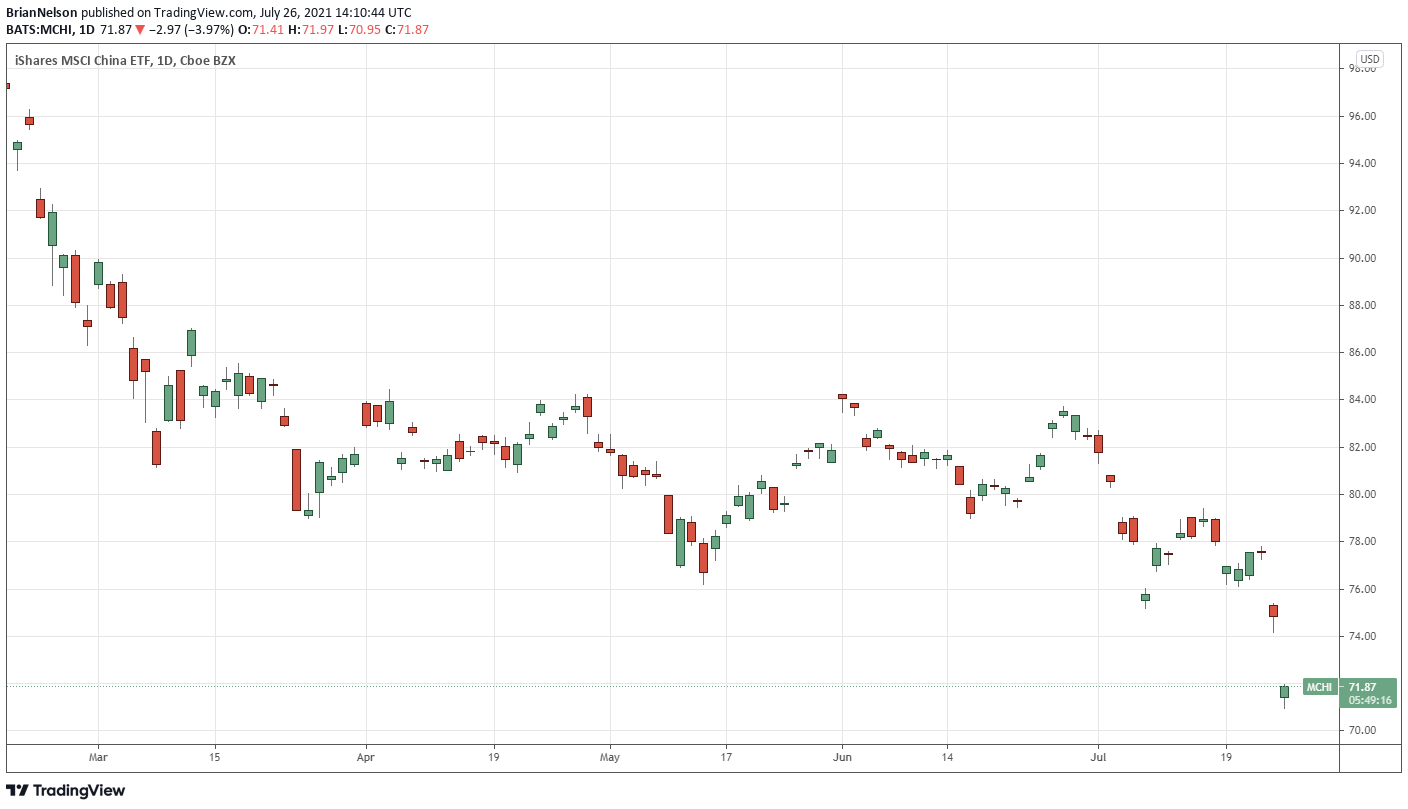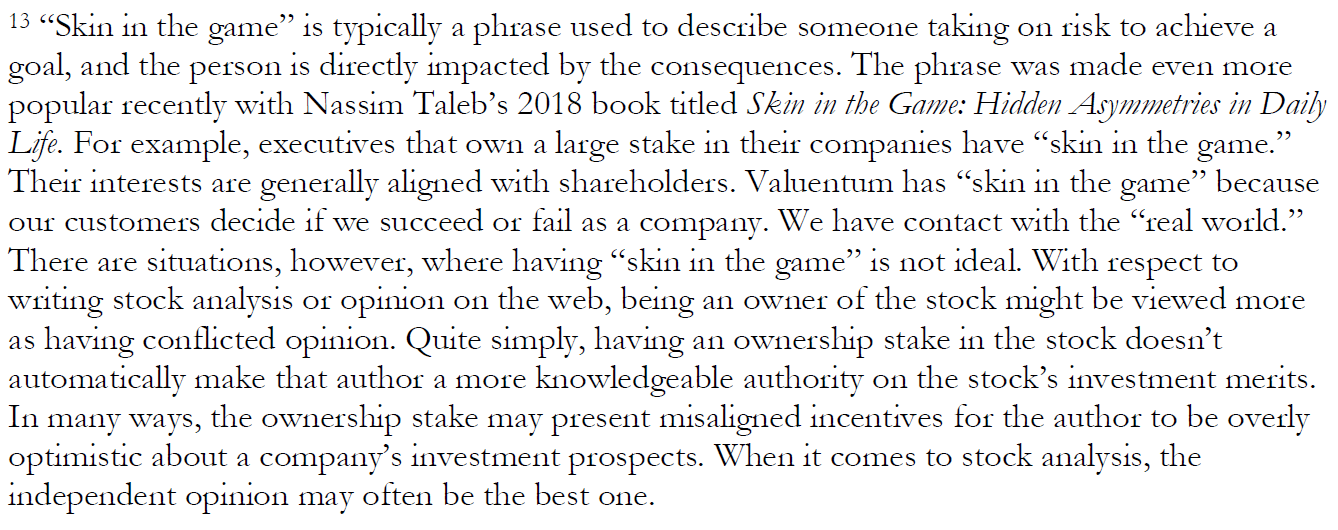Member LoginDividend CushionValue Trap |
Chinese Stocks Getting Hammered
publication date: Jul 26, 2021
|
author/source: Brian Nelson, CFA
Image shown: A confluence of factors are driving Chinese stocks lower, not the least of which is heightened regulatory concerns. By Brian Nelson, CFA The collapse in Chinese equities (FXI) (MCHI) during the trading session July 26 is a reminder (again) why you should consider combining momentum with *enterprise valuation* in stocks, as in the Valuentum process. It’s not enough for you to think a stock is undervalued or cheap. The market must agree with you, too. A falling stock price says the market disagrees. Our favorite ideas for consideration are always in the newsletter portfolios, whether the Best Ideas Newsletter portfolio, Dividend Growth Newsletter portfolio, or High Yield Dividend Newsletter portfolio. We do not have any direct exposure to Chinese equities in any of the portfolios. As a reminder, we do not think owning disparate assets just for the sake of “di-worsification” makes any sense, and we don’t view volatility as a measure of risk. Our focus continues to be on net cash rich, free cash flow generating assets that are undervalued on a discounted cash-flow basis that are also showing resilient share-price momentum--and that we have confidence in their financials and business models. In the case of Chinese equities, we don’t need the trouble. There are plenty of undervalued+momentum (Valuentum) opportunities in the US, including 10-rated Facebook (FB) and top-weighted ideas such as Alphabet (GOOG) and Visa (V), which are at the very top of the Best Ideas Newsletter portfolio. We don’t think investors should overreact if they have exposure to Chinese ADRs such as Alibaba (BABA) and Baidu (BIDU), but there are tremendous risks venturing outside the US with your hard-earned money. The regulatory environment in China is unpredictable and geopolitical tensions have only intensified from COVID-19 and Taiwan (EWT). We’re not interested in adding any exposure to Chinese names on weakness, and we even highlighted DiDi Global (DIDI) as a short-idea consideration a number of weeks ago in the Exclusive publication. Almost a year ago now, on October 28, 2020, we removed Intel (INTC) from the newsletter portfolios. That means it no longer is a “best idea” as it relates to our opinion. Year-to-date, shares of Intel are up ~7%, while the broader S&P 500 (SPY) has advanced nearly 18%. We’re not looking back. As we noted last October, “competitive pressures and a balance sheet that sports a growing net debt position make it much less attractive of a stock.” Its rumored possible acquisition of GlobalFoundries may only further bloat its balance sheet. We continue to prefer healthy balance sheets in this market environment, namely ones with huge net cash positions. Within the enterprise valuation process, net debt is a subtraction to the present value of future enterprise free cash flows to get to equity value. If you're not looking at the balance sheet, you're going to find yourself exposed to low P/E stocks that are likely overpriced due to their massive net debt positions. Such may be the case with IBM (IBM), which holds a massive net debt position as it trades at ~12x next year’s consensus earnings per share (its price-to-fair value estimate ratio stands at 1.06). You can’t just use a simple P/E ratio as a deterministic measure of valuation. Be careful with valuation multiple peddlers. We think some of the consumer staples companies may stagnate in the coming months as they deal with some inflationary pressures before their product price increases can take hold. Conagra (CAG) is facing some major inflationary headwinds, while Unilever (UN) (UL) noted that it expects cost inflation to be in the “high teens” percentage as a result of huge increases in the costs for crude oil (USO) (OIL), palm oil, soy bean oil, as well as shipping costs. Inflation was cited 31 times in the Unilever release. Kimberly-Clark (KMB) also warned of “significantly higher input costs” in its second quarter release. We’re not overweight consumer staples equities, per se, though we do have broad exposure in the High Yield Dividend Newsletter portfolio via the Vanguard Consumer Staples ETF (VDC). We believe the consumer staples group may be the most vulnerable to inflationary headwinds, but the group may also be among the best positioned to increase prices to offset them in light of their tremendous brand recognition and consumer mindshare. We think long-term dividend growth investors should still take note of the added risks in this space should consumers start pushing back and volumes weaken. That said, inflationary pressures are generally good for equities over the long haul, provided there is not a dislocation in the 10-year Treasury, which continues to trade at sanguine levels. Billionaire Lee Cooperman may have said it best: "Corporations incorporate the inflation in their costs into their selling prices, which lift the nominal levels of revenue and earnings." That’s why we’re huge fans of companies with pricing power in this environment, those that can price their products ahead of cost inflation to drive substantial earnings and free cash flow expansion. Though many of the commodity players will benefit from higher commodity prices, which is why we recently added ExxonMobil (XOM) and Chevron (CVX) to the newsletter portfolios, they will always be exposed to the boom-and-bust commodity price cycles. On the other hand, large cap growth and big cap tech are largely insulated from most commodity price inflation, especially some of our favorite names such as Facebook, Alphabet, Visa and PayPal (PYPL). We love large cap growth in a normalized environment and prefer it in an inflationary environment. Investing is really simple. You don’t need to find terribly underfollowed ideas to do well, just mispriced ones. For example, Alphabet is up over 80% the past 52 weeks, and the company has been a top weighting in the Best Ideas Newsletter portfolio for some time. Facebook has also been an outperformer. There’s no need to make things complicated. Focus on undervalued stocks on a DCF basis that have strong market support through relative strength or a solid technical breakout--and stay away from those net-debt heavy, low valuation multiple value traps! ----- Also tickerized for stocks in the MCHI. It's Here!
The Second Edition of Value Trap! Order today!

-----
Image Source: Value Trap ---------- Valuentum members have access to our 16-page stock reports, Valuentum Buying Index ratings, Dividend Cushion ratios, fair value estimates and ranges, dividend reports and more. Not a member? Subscribe today. The first 14 days are free. Brian Nelson owns shares in SPY, SCHG, QQQ, DIA, VOT, and IWM. Brian Nelson's household owns shares in HON, DIS, HAS. Valuentum owns shares in VOO, SCHG, DIA, and QQQ. Some of the other securities written about in this article may be included in Valuentum's simulated newsletter portfolios. Contact Valuentum for more information about its editorial policies. |




0 Comments Posted Leave a comment